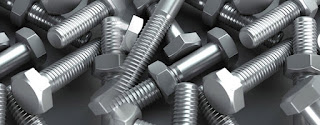Understanding the Different Finishes of Stainless Steel Fasteners
These stainless fasteners are important in various industries hence being widely used because of its strength, the ability to withstand high pressure and corrosion. Still, there is one main aspect to consider in most stainless steel fasteners, and that feature is the finish. Some of the ways that a fastener’s finish impacts its overall performance include overall appearance and suitability to various applications. Here let us discuss about various types of finishes on Stainless steel fasteners and how one should select right finish. Rebolt Alloys is a famous SS Fasteners Manufacturers in Mumbai.
What Are Stainless Steel Fastener Finishes?
The term finish on a stainless steel fastener relates to the manner in which a fastener is processed on or after fabrication. These one can improve the properties of the fastener, including its resistance to corrosion and other factors, its appearance, and its ability to withstand wear and tear. The knowledge of the various types of finishes will assist one in determining on the best fastener to be used in a particular application. items:SS Fasteners Manufacturers in India and fasteners manufacturers in Coimbatore
Common Finishes for Stainless Steel Fasteners
Passivation
Passivation, therefore, refers to a chemical treatment that does not create a surface film of corrosion protection but rather makes stainless steel naturally resistant to corrosion. This stage requires washing the fastener’s surface in order to eliminate different types of interference and next immerse it in an acid bath in order to obtain a layer of oxide. This finish is often preferred in several circumstances that involve exposed fasteners to moisture or chemicals. Nut bolt weight chart in kg pdf and stud bolt weight chart in kg
Benefits:
Improved corrosion resistance.
Enhanced durability.
Electro-Polishing
Electro-polishing is an electrochemical treatment which removes a surface layer of material from the fastener and endows-with it a smooth shiny surface. This finish last not only beautifies the surface of the fastener; it also minimize the chances of corrosion by eliminating surface irregularities. fasteners manufacturers in Pune and fasteners suppliers in Kuwait.
Benefits:
Smooth, mirror-like finish.
Improved corrosion resistance.
Easier to clean.
3. Black Oxide Coating
This is a chemical treatment that gives black, dull-looking covering to the stainless steel fasteners; Black oxide coating. This finish make the fasteners look beautiful and offer reasonable protection to corrosion.. It is utilised in regions where aesthetics form a critical consideration including car manufacturing or architectonics.Rebolt Alloys is a trusted and certified Stainless Steel Fasteners Manufacturers in India
Benefits:
Attractive matte finish.
Moderate corrosion resistance.
Reduced light reflection.
4. Zinc Plating
One of the processes applied in preparing the stainless steel fastener involves is zinc plating which entails covering the fastener with zinc. This finish also provides the fasteners with a secondary layer of protection from the corrosion and is commonly utilized where exposure to moisture is inevitable. Nevertheless, the problem with zinc plating is, can wear off with time, or due to some physical conditions.
Benefits:
Added corrosion protection.
Cost-effective.
Suitable for various applications.
5. Teflon Coating
Teflon, or PTFE, coating on stainless steel hardware gives a non-stick surface to the screw fasteners. This finish is highly resistant not only to chemicals and corrosion and as such is more suited for application in areas that requires handling of chemicals and operations afloat such as chemical processing units and the marine industry.
Benefits:
Excellent chemical resistance.
Non-stick surface.
High corrosion resistance.
Choosing the Right Finish for Your Application
When selecting a finish for your stainless steel fasteners, consider the following factors:
1. Environmental Conditions
Consider where the fasteners will likely be utilized or where they need to be utilized before making a purchase decision. For example, fasteners that are used in humid environments, in chemical processes or near salt water will receive coating and/or treatments that increase its resistance to corrosion such as passivated, electro-polishing or Teflon coating.
2. Aesthetic Requirements
If your project needs an aesthetic appeal, you should look at the types that give the project a good look like electro-polishing finishing which gives the product a shiny appearance or the black oxide coating finish that gives the product a matte looking appearance.
3. Durability Needs
If you need to make the fastener withstand significant stress and last for a long time, give preference to such coatings as Teflon or passivating layer as they help to increase the fastener’s performance characteristics and make it more resistant to wear.
Conclusion
It is therefore necessary that you know what exactly stainless steel fasteners’ finishes are so that you can make the right choice when making your purchase. For a stronger and thicker layer that provides increased corrosion protection, a wrinkle finish may suffice your needs. Through an analysis of the various environmental factors, the nitpicky artistic tastes, and the hard-wearing requirements of your application, the stainless steel fasteners will do the job they are required to do, as expected.




Comments
Post a Comment